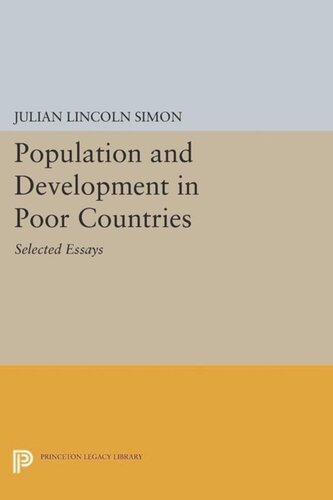

Most ebook files are in PDF format, so you can easily read them using various software such as Foxit Reader or directly on the Google Chrome browser.
Some ebook files are released by publishers in other formats such as .awz, .mobi, .epub, .fb2, etc. You may need to install specific software to read these formats on mobile/PC, such as Calibre.
Please read the tutorial at this link: https://ebookbell.com/faq
We offer FREE conversion to the popular formats you request; however, this may take some time. Therefore, right after payment, please email us, and we will try to provide the service as quickly as possible.
For some exceptional file formats or broken links (if any), please refrain from opening any disputes. Instead, email us first, and we will try to assist within a maximum of 6 hours.
EbookBell Team

4.7
16 reviewsMaking the case that population growth does not hinder economic progress and that it eventually raises standards of living, Julian Simon became one of the most controversial figures in economics during the past decade. This book gathers a set of articles--theoretical, empirical, and policy analyses--written over the past twenty years, which examine the effects of population increase on various aspects of economic development in less-developed economies. The studies show that within a century, or even a quarter of a century, the positive benefits of additional people counterbalance the short-run costs. The process is as follows: increased numbers of consumers, and the resultant increase of total income, expand the demand for raw materials and finished products. The resulting actual and expected shortages force up prices of the natural resources. The increased prices trigger the search for new ways to satisfy the demand, and sooner or later new sources and innovative substitutes are found. These new discoveries lead to cheaper natural resources than existed before this process began, leaving humanity better off than if the shortages had not appeared.
Originally published in 1992.
The Princeton Legacy Library uses the latest print-on-demand technology to again make available previously out-of-print books from the distinguished backlist of Princeton University Press. These editions preserve the original texts of these important books while presenting them in durable paperback and hardcover editions. The goal of the Princeton Legacy Library is to vastly increase access to the rich scholarly heritage found in the thousands of books published by Princeton University Press since its founding in 1905.